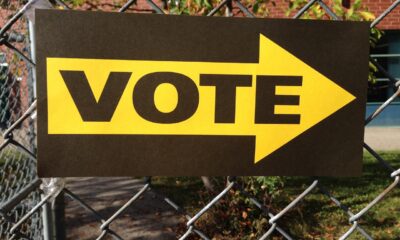Executive
Paper ballots suggested in Georgia county
Spalding County, Georgia took a step that could lead to paper ballots in the next election, after Georgia refused to update its machines.
Two nights ago a county legislative body in Georgia took a step that could force the use of paper ballots. They didn’t order the Board of Elections to switch to paper ballots, because they hadn’t the authority. So they cut the Board’s funding, thus highlighting one key disadvantage of electronic voting machines: their operating expense.
Advantage: paper ballots
Recall that all counties in Georgia use electronic scanner-tabulators and Ballot Marking Devices from Dominion Voting Services. Those machines are the subject of a federal lawsuit seeking to discontinue their use, on grounds of election integrity. Last week the trial court unsealed a report by Alex Halderman of the University of Michigan. He filed this report on July 1, 2021, but it stayed under seal ever since – until last week.
Simply put, the Ballot Marking Devices suffer from “critical vulnerabilities” that bad actors could exploit to bypass “all… security mechanisms.” Even knowing this, the Georgia Division of Elections will not update the device software until after the 2024 elections. Apparently such an update will take time that the Georgia Department of State says it doesn’t have, according to CNN.
To justify putting off the upgrade, they cited a competing report by MITRE Corporation, which Dominion retained to rebut the Halderman report. MITRE insists that five of Halderman’s six attack scenarios would not work at scale. The sixth, said MITRE, would never succeed given the security procedures already in place “in operational election environments.” Meaning that – in theory – alert Officers of Election, their chiefs, and election supervisors would stop or catch the attack.
Michigan’s Department of State upgraded their machines. Prof. Halderman is furious with Georgia officials for not doing the same thing.
Spalding County votes to put the squeeze on
On Tuesday evening (June 27), the Spalding County Board of Commissioners did something about this. Again, they lacked the authority to tell the Board of Elections specifically to move to paper ballots. So instead, according to The Georgia Record, they voted 5-0 to cut the Election Board’s budget by $85,000. Presumably that shortfall would be critical, given the operating expense of the scanner-tabulators and marking devices. In a summary that activist Seth Keshel quoted in his Substack page, the Commissioners “gave [their] consent” to the Elections Board to do what it takes – including going to paper ballots.
The Elections Board has scheduled its next meeting for July 11, and the reduced budget will be on the agenda.
Mr. Keshel also shared two images of a letter from attorney Alex Johnson. That letter highlights concerns citizens have already expressed about the use of electronic voting machines. It also mentions efforts by some “county attorneys,” whom Johnson would not name, who are spreading fear that any County Board of Elections that moves to paper ballots would have to answer to the State Board of Elections. Not true, said Johnson, who cited a 2022 law that specifically authorizes paper ballots if the machines won’t work.
And the machines won’t work
Johnson then proceeded to tell the Board of Commissioners why the machines won’t work. The 2022 Democratic Party primary in DeKalb County, Georgia apparently had too many candidates. For that, and “other reasons,” Johnson said the machines are simply impracticable.
Johnson then hit squarely at the issue Alex Halderman highlighted in his report. Namely that Dominion’s Ballot Marking Devices do not produce human readable output. They produce Quick Response codes – those square designs with black blocks on a white background that a smartphone, using its camera, can turn into a Web address, or machine-readable text. Human beings do not know or learn how to read Quick Response codes. So no one knows, as they feed them to the scanner, that they accurately reflect the votes they marked. Halderman pointed out that someone could change how the machine makes out those codes, and neither voter nor Officer of Election would be any the wiser.
The law says a ballot that comes from a marking device must be human readable. For that very reason, Dominion’s marking devices break the law. Citing this, Johnson urged everyone concerned to move to paper ballots that voters mark by hand.
Two ways to handle paper ballots
Hanover County, Virginia makes ballot marking devices available as an option – and those devices produce human-readable ballots. But most voters mark an 8.5 by 11 paper ballot by hand and scan that. Presumably that’s how elections work with the use of scanner-tabulators in most jurisdictions. But the Dominion system, at least in Georgia, mandates use of a ballot marking device – and the voter can’t even read what comes out of it.
As Mr. Keshel reported, members of the Spalding County Board of Elections recently testified before the Georgia Board of Elections in a rather troubling case. Apparently a Dominion device printed a ballot on what looked like “notebook paper.” The scanner-tabulator accepted that as a valid cast vote. How could that happen? Officials still don’t know.
But the decisive victory will come with the elimination of ballot marking devices and scanners. Seth Keshel specifically advocates for this. He says:
With fewer than 30,000 votes to process, the county should easily be able to run paper-only elections and count those ballots by hand at the precinct and have them reported accurately and in timely fashion.
How to run an efficient election with paper only
Recently CNAV highlighted French voting procedures. France uses a form of paper ballots called bulletins that have candidates’ names on them. Voters select their choices from these, seal them in envelopes, and drop them into transparent boxes. Afterwards, election officials open the envelopes, sort out the bulletins, and count them. Typically they have results within twenty-four hours – and in France, the paper ballots have the legal force.
The reaction to Mr. Keshel’s tweet shows that other activists are eager to have their counties do the same.
Actually, for Spalding County to do away with marking devices but not scanners, might not be possible. Dominion Voting has supplied a scanner that accepts a Quick Response code, not a hand-marked ballot. So if this county doesn’t use the marking devices, they won’t use the scanners, either. And that’s exactly what election integrity activists want: paper ballots, that voters mark by hand, and officials count by hand.
Already this movement is meeting resistance. Shasta County, California, moved to paper ballots last January. That was one change that made the CEO of Dominion fear for the company’s future. But as one resident showed, California State officials took steps to reverse that.
That bill hasn’t passed – yet. But The Fresno Bee carried a scathing opinion saying the county would spend more to count ballots by hand. Part of the problem is that disabled voters require some kind of electronic assistance. French-style bulletins would solve the problem, because they are pre-printed.
Conclusion
The path to using paper ballots without scanners won’t be easy. Silly opinions like that of The Fresno Bee, that exist merely to spread fear, uncertainty, and doubt, won’t help. But CNAV sees no reason to keep running elections with scanners, which themselves are “black boxes” that Officers of Elections must simply trust without being truly able to verify. And we see no excuse for using ballot marking devices, the output of which the voter cannot read.
Spalding County, Georgia, has taken yet another step, and a necessary one, to restore faith in our elections.
Terry A. Hurlbut has been a student of politics, philosophy, and science for more than 35 years. He is a graduate of Yale College and has served as a physician-level laboratory administrator in a 250-bed community hospital. He also is a serious student of the Bible, is conversant in its two primary original languages, and has followed the creation-science movement closely since 1993.
-

 Civilization2 days ago
Civilization2 days agoWhy Europe Shouldn’t Be Upset at Trump’s Venezuelan Actions
-

 Accountability5 days ago
Accountability5 days agoWaste of the Day: Principal Bought Lobster with School Funds
-

 Executive3 days ago
Executive3 days agoHow Relaxed COVID-Era Rules Fueled Minnesota’s Biggest Scam
-

 Constitution4 days ago
Constitution4 days agoTrump, Canada, and the Constitutional Problem Beneath the Bridge
-

 Christianity Today2 days ago
Christianity Today2 days agoSurprising Revival: Gen Z Men & Highly Educated Lead Return to Religion
-

 Civilization3 days ago
Civilization3 days agoThe End of Purple States and Competitive Districts
-

 Executive3 days ago
Executive3 days agoWaste of the Day: Can You Hear Me Now?
-

 Executive4 days ago
Executive4 days agoWaste of the Day: States Spent Welfare in “Crazy Ways”










